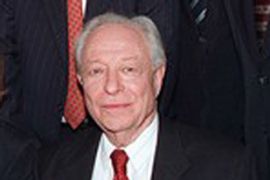US neoconservative Kristol dies
“Godfather” of US neoconservatism heavily influenced the George Bush administration.

While attending college in New York in the 1930s, Kristol was a follower of the Russian Communist Leon Trotsky.
Perceived failures
He later soured on socialism and became a liberal, but also left those ideas behind as he became increasingly disillusioned by the perceived failures of President Lyndon Johnson’s Great Society, whose government programmes did not manage to solve problems such as the rise of crime and drug abuse.
During the rise of the New Left in the 1960s and 1970s, Kristol finally became a supporter of the Republican Party, which he said was once as “foreign to me as attending a Catholic mass”.
He became a leader in the network of think-tanks, media outlets and corporations that helped make US conservatism a reigning ideology for at least two decades.
“The influence of Irving Kristol’s ideas has been one of the most important factors in reshaping the American climate of opinion over the past 40 years,” said Norman Podhoretz, another neoconservative theorist.
‘Mugged by reality’
Kristol released several books, including Neo-Conservatism: The Autobiography of An Idea, and co-founded a neoconservative journal, The Public Interest.
He was a contributor to The Wall Street Journal, writing a series of essays in the 1970s that urged businesses to invest in conservative scholarship and counter the “permanent brain trust” of liberal politics.
The neoconservative movement was named by Michael Harrington, a socialist writer, in the early 1970s, and Kristol defined a neoconservative as a liberal who had been “mugged by reality.”
Kristol was the son of Jewish immigrants from Ukraine, born in New York’s Brooklyn neighborhood.